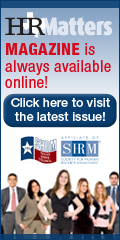HR Matters
Texas SHRM
CALENDAR OF EVENTS
Prepare your volunteer slate of officers to hold elections in accordance with your bylaws. Review your volunteer succession plan; determine where you will need volunteers to fill roles on your board and committees. Start soliciting for new volunteers!
President-elect and/or president should plan to attend and register for the November SHRM Leadership Conference (book hotel and travel). E-mail invitations will be sent sometime during late August.
If there have been any changes in your volunteers, report them to your Regional Administrator. Keep SHRM informed of any changes to volunteer e-mail addresses, contact information, and role changes.

NEWS
WGU Texas has partnered with the Texas State Council to offer $2,000 "Go Further in HR Scholarships".
These scholarships are designed for motivated HR personnel who wish to continue their education and earn a bachelor's or master’s degree.
WGU Texas Business College offers MBA degree programs in addition to a B.S. in Business Human Resource Management degree that provides expertise in the management of people at work, giving HR professionals the skills and knowledge to become an effective HR manager and staff specialist. This program covers the six categories that make up the HR Body of Knowledge established by the Human Resources Certification Institute (HRCI) and as part of this program, students are required to pass one of two HR-specific, recognized industry exams:
• The Professional in Human Resources (PHR) Certification Exam (administered by HRCI)
OR
• The Assurance of Learning Exam (administered by the Society of Human Resource Management (SHRM)).
WGU Texas is a nonprofit, online university designed to expand access to higher education and meet the education needs of busy adult learners.
Here's why you should consider WGU Texas:
• An innovative, competency-based approach to education designed to let you take advantage of your prior experience and possibly accelerate your program.
• Personalized, one-on-one faculty support.
• A nonprofit university with affordable, flat-rate tuition.
• Regionally accredited online bachelor's and master's degrees in health professions (including nursing), business, information technology, and teacher education.
• Federal financial aid and scholarships available to those who qualify.
• No set class times. Study anytime, anywhere.
For eligibility requirements and to apply for the Go Further in Human Resources Scholarship, visit http://texas.wgu.edu/tuition_financial_aid/scholarships/gofurther_hr_overview.
Or Contact:
Dr. Wendi Prater, Austin 512-934-0663
Linda Harris, Dallas 972-841-2440
Kristian Fitzgerald, Houston 832-723-7463
Joe Rodriguez, San Antonio / El Paso 210-204-2738
WGU Texas Community Relations Team
We would like to invite you to participate in the ninth annual Best Companies to Work for in Texas program to find out if your company is a "best place to work"! The 2013 Best Companies to Work for in Texas is a survey and analysis program dedicated to identifying and recognizing the best employers in Texas. This is the only state-wide program of its kind for Texas and it is fully supported and endorsed by the publishers of Texas Monthly, the Texas Association of Business (TAB), the Texas State Council of the Society for Human Resource Management (TSC-SHRM), and Best Companies Group. The rankings of the list-making companies will be revealed for the first time at a special awards event in April 2014. Profiles of the list-making companies will also be highlighted in a special publication of Texas Monthly to be released in conjunction with the event.
Please visit www.BestCompaniesTX.com for more information and a registration form. The registration deadline is August 30, 2013.
Best Companies Group manages the process and will be conducting thorough assessments of all the registered companies including a survey of the Texas-based employees. The survey process is made up of 2 surveys: 1) Employer Benefits & Policies Questionnaire and 2) Employee Engagement & Satisfaction Survey. You can choose to survey your employees online or use our traditional paper survey process. You can find a description of the assessment, registration fees and survey process under Assessment Process, and answers to most of your questions under the FAQ’s on the website. Please visit the Timeline for upcoming dates and deadlines.
While determining who makes "the list" is very exciting and extremely beneficial to the ranked companies, the Best Companies Group Employee Feedback Report is where the real value lies. All participating companies will receive the results of the employee survey, identifying the strengths and weaknesses of their workplace according to what their employees had to say. This is a great way to identify the opportunities that exist to build a better workplace! As an added value, each company will receive benchmarking data, which may be used to compare oneself to the list-making companies and the overall participants.
For samples of our surveys and reports please review the Best Companies to Work for in Texas website at www.BestCompaniesTX.com under Survey & Reports Samples.

CHAPTER CHATTER
Concho Valley SHRM will be hosting their annual seminar on September 12, 2013 at the McNease Convention Center from 8:00am-5:00pm. This year’s full day seminar will feature topics such as Emerging Workforce Study presented by Sandy Mazur (Spherion), Worker's Compensation by Pat Crawford (Texas Dept of Insurance/Division of Workers Compensation), Legislative Update by Jon Mark Hogg (Jackson Walker LLP), Affordable Care Act presented by Justin Barbour (Schmoyer Reinhard LLP), and "You're Not the Boss of Me: Regulating Employee Conduct" presented by Tiffany Cox and J. Robert White (Ogletree, Deakins, Nash, Smoak & Stewart, PC). Lunch will be provided. For more information please go to http://conchovalley.shrm.org.
BV-SHRM coordinated and completed a 13-week certification study program (January 31, 2013 to May 2, 2013). The program participants met one evening a week for 3 hours, to review and learn the six areas of the assigned body of knowledge. The facilitators, all current and former BV-SHRM Board Members, utilized the 2013 SHRM Learning system and its various state-of-the-art learning materials, to assist the members in their certification preparation.
BV-SHRM would like to recognize 6 newly certified members and the dedicated, caring group of facilitators who helped make this possible.
Newly certified members:
Michelle Merritt, PHR
Angela Orozco, PHR
Andrea Shirocky, PHR
Jordan Miller, PHR
Kim C. Flores, SPHR
Lee Felder, SPHR
Facilitators:
Bob Hensz, SPHR
Cheryl Young, SPHR
Stacy Overby, SPHR
Retha Youell, SPHR
Sarah Tobola, SPHR
Tom Owen, SPHR
Tom Holt, SPHR
The North Texas Society for Human Resource Management sponsors the Certification Study Group to assist HR professionals in preparing to sit for the Human Resource Certification Institute's certification exam that confers the Professional in Human Resources (PHR) and Senior Professional in Human Resources (SPHR) designations. The Study Group offers regular meetings with presentations by an experienced instructor and an opportunity to meet other professionals also studying for the exam. For more information contact Jana Bates at 940-898-3553.
August 22, 2013: The guest speakers for our monthly luncheon will be Erik Templin and Dale Brickert from the Hays Companies of Texas. The title of their presentation is "Developing a Winning Health Plan Strategy to Survive Health Care Reform". The program has been approved by HRCI for recertification credit. For more information visit our website at www.northtexasshrm.org.
Save the date: September 20, 2013 is the North Texas SHRM "Race to Compliance" legal update. It is scheduled from 8am to 5pm in Denton. Featured speakers will include Lon Williams, Karen Denny Coomer, and Shannon Norris, among others. There will be no cost to attend but seating is limited. HRIC certification is pending. Go to our website www.northtexasshrm.org for more information.
MyMatters
This is the first segment of a mini-series that discusses the behavioral aspects of corporate culture.
If you have been involved in an organization where things are going smoothly, performance is optimum, it’s a well-oiled machine and you feel excited and enthused about going to work every day, chances are you are in a corporate culture that suits you well. On the other hand, in the event you had to change jobs for whatever reason and you now find yourself struggling with success in this new environment and not really understanding why, it may not be you at all. Chances are it’s the corporate culture.
Think about the various corporate cultures that you may have been involved in throughout your career. Were you "on a roll" or was your enthusiasm squelched? Did your performance soar or suffer? Did you tackle assignments with ease or lack motivation to do your job? As career builders, we think of salary and responsibility and maybe even geographic location, but the uniqueness of the culture usually doesn’t rank in the top three. Likewise, as we select individuals into our organizations we often reference cultural fit, but how likely is it that we turn away a star candidate who is "head and shoulders above the rest" because of a cultural mismatch? We envision this candidate going through cultural integration within our organization while boasting about our unique organization. Emphasis isn’t always placed on culture in the decision-making process as a job seeker or as a hiring manager.
Studies show that if you put a good performer in a poor work environment, the environment will win every time (Gilbert, 1997). The careers industry touts the statistic of 75% people being unhappy in their current employment. This figure suggests that corporate culture has a greater influence on performance and workplace satisfaction than might be realized. Therefore, it helps to understand the influence of corporate culture on an individual’s success.
There are typically four different types of culture: power culture, role culture, task culture, and person culture (Jones & Robinson, 2012).
Power Culture:
Power culture depends on a central power source, such as the founder of the company. Individuals and relationships are emphasized over expertise and knowledge in the power culture. This is an environment of who you know, not what you know. The power culture is highly results-oriented but very abrasive. Gut instinct is used for decision making and few rules apply. Athletic organizations are an example of a power culture (Jones & Robinson, 2012).
Role Culture:
Role culture is also known as a process culture and can be highly bureaucratic as well as logical and rational. It is very procedural where managers and employees are careful to follow rules and regulations in a highly structured environment with very clear lines of leaderships. The role culture is reliable, stable and predictive but may not offer much creativity. An example of a role culture is a health services organization such as a hospital (Jones & Robinson, 2012).
Task Culture:
Task cultures are typically found in high-risk types of environments such as explorative, developmental and project-oriented. Teams and task forces make - up the task culture where there is a great deal of creativity and cross-function. While the environment lacks stability, it offers excitement and opportunities to quickly build experience by serving in many roles. Task cultures are found in startups or exploratory operations, such as oil and gas ventures (Jones & Robinson, 2012).
Person Culture:
A person culture is an individualistic type of culture. Employees have a great deal of autonomy and freedom with a key responsibility of serving other people. An individual’s people skill is the preferred management style in this type of culture. A person culture can be found in universities and consulting firms (Jones & Robinson, 2012) .
General features of organizational culture can be the following:
- A clearly defined purpose – the company knows its goals and employee contributions.
- Employees support the organization and demonstrate support for company success.
- Adaptability – a company with strong organizational culture will possess the flexibility that it needs to embrace change (Jones & Robinson, 2012).
One thing that we must remember is that people define corporate culture (Jones & Robinson, 2012). While corporate culture is embedded deep in an organization, it typically carries on the personae of the founder. Therefore, creating an optimum behavior match between a corporation’s unique culture and their employees by identifying the behavior style of each may lead to enhanced performance and employee satisfaction. Which corporate culture do you see yourself? In our next segment we will look more closely at behavior styles in relation to the types of culture.
TECHNOLOGY
As I was working on my laptop in my hotel room, my mousepad and keyboard locked up. I reluctantly called my work’s technology support line. After waiting a few minutes, the lady who answered could not figure out the problem. She then instant messaged with a guy who was in a different location so that he could try to help. He couldn’t figure out the problem either. So while I waited impatiently, I grabbed my I-Pad and started googling ‘how to unlock mousepad and keyboard’. Immediately the answer popped up on my screen with step-by-step instructions, pictures, and even a YouTube video that showed how to fix the problem. So I told the support team I found the answer and even copied the information and emailed it back to them in case someone else had the same problem.
As I went through this whole process, it dawned on me, this happens every day in our businesses and in particular HR. We are surrounded by information. It is all around us in hundreds of different ways. Information is knowledge and as human resource professionals we are charged with wading through the information and providing knowledge to our chapters and businesses we represent. The experience I had with my laptop made me realize that we don’t always have the answers ourselves. But technology has made information available to all of us just with the click of a button. It is important for us to understand how technology has intertwined itself into our world and the world of our employees and chapters.
As the SHRM- Texas State Council we strive to help Chapter leaders see through the weeds and find solutions for their chapter needs. Information can be overwhelming. Our goal is to streamline relevant information, while bringing the State Council fresh content, best practices and resources for success. How can you connect to this information? Follow us on Facebook and Twitter, read what’s new on our Blog, and connect with us on LinkedIn! All of the ways to connect are located on our website at http://texas.shrm.org
Shannon Elrod
Co-chair of Technology
|
|






